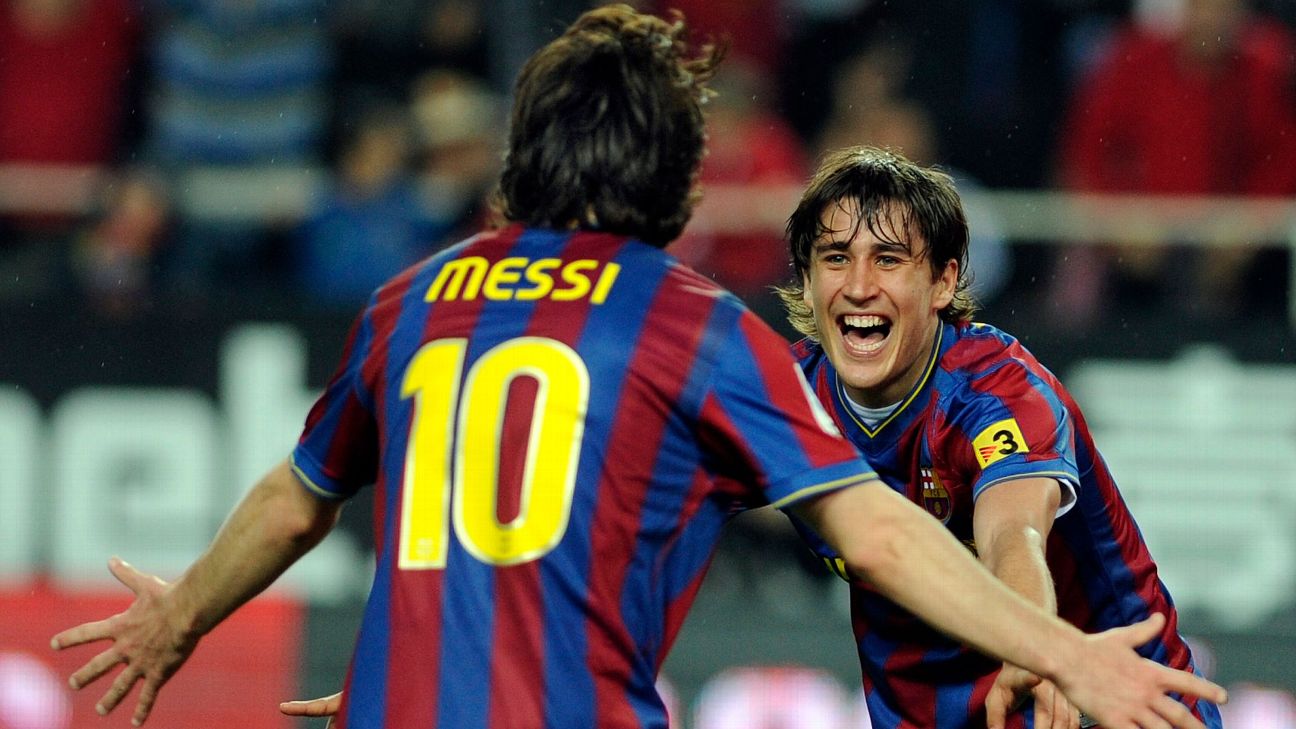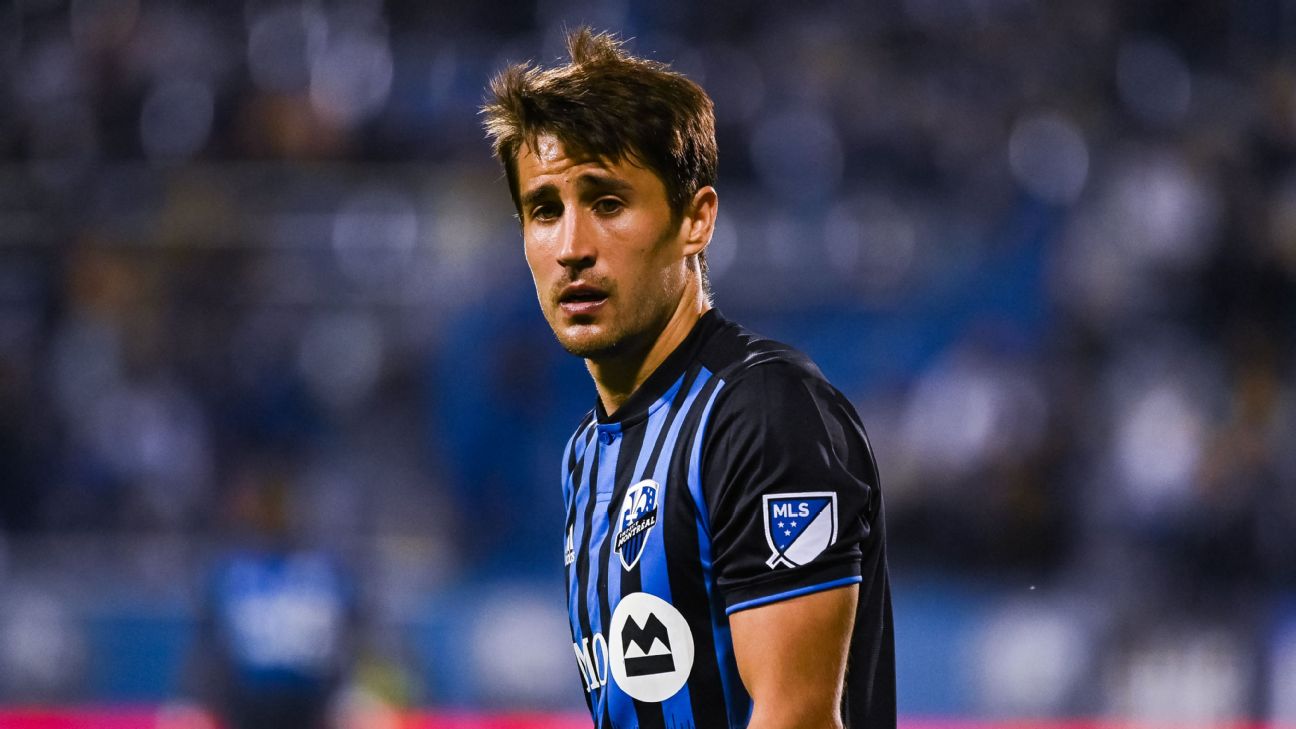Products You May Like
MONTREAL — “Freedom.”
That’s what Bojan Krkic is chasing on the pitch. It’s also the way he describes how he’d like to play football. He has found it in small doses during his decade-and-a-half-long playing career: briefly on Barcelona‘s youth teams where he broke many age-related scoring records, earning the unbearable burden as “the next Messi”; at free-flowing Stoke City under Mark Hughes, until injuries and a more direct style derailed that experiment; in Milan for half a season.
Now he’s trying to find it with Thierry Henry’s Montreal Impact, a club he joined last August at a time when the former wonderkid wasn’t entirely out of options but wasn’t exactly drowning in them, either.
– Stream new episodes of ESPN FC Monday-Friday on ESPN+
— Stream every episode of 30 for 30: Soccer Stories on ESPN+
— MLS could lose billions due to coronavrius
“Football, you know, is about the present,” Bojan says in the lobby of a five-star hotel just off a main strip in Montreal, before the COVID-19 crisis shut down MLS for the time being. “And when you are not playing, it doesn’t matter how many games you played. It doesn’t matter where you played, you know, so it was tough to find a team in Europe where the mentality of the camp was playing football. For me, [my] last teams, they were not like my style, my type of football.”
Bojan lives here for now (upstairs in a room, not the lobby), the latest step in a nomadic career that has been simultaneously better than what almost anyone should reasonably expect (78 goals and 35 assists in almost 400 games for eight teams) and disappointing (he never lived up to the “the next Messi” label, as if that was ever a fair standard). He’s wearing the typical footballer-away-from-training uniform: a tasteful D-Squared sweater, tight jeans, bright white sneakers that are very new, very nice and very out of place in a city where even suits are paired with heavy boots.
We’re talking about soccer, and his hopes and dreams in Canada, but also about life generally. Somewhere along the way — early, way too early — the two became inextricably linked for Bojan.
He’s older now, 30 this summer, but spent all of his 20s trying to figure out how to pull the two apart, or at least make them coexist in a way that didn’t feel overwhelming. While he doesn’t want to talk about the panic attacks that led him to decline a call to the Spanish national team in 2008, it’s clear the experience colored how he thinks, where he plays and what he does. There’s an element of self-care in how he talks about what he wants from his life. Bojan, small with an innocent, boyish face that has scattered signs of aging — the slightest crow’s feet near his eyes, a wrinkle or two on his forehead — is too quiet and reserved to be one of football’s philosopher kings, but listen closely and the accumulated wisdom surfaces.
“For me, the money is not the most important thing. For me, to be in the best team in the world is not the most important thing,” he says. “For me, the most important thing is to be in a place where I can enjoy playing football, where I can help the team, the club, and where I can feel that they believe in me.”
He wants to be happy. He wants freedom, on the field and off. Isn’t that what you’d want, too?
Last year, Bojan felt that love from Montreal, and believing he might find that freedom again, he signed with the club. On paper, it was an unusual choice. The Impact, with all due respect, have not been good, missing the Major League Soccer playoffs in each of the past three seasons. “I hope you can write them into a better future,” the border guard said after I told him I was coming to Canada to do a story about the team.
This season, however, had started well — before the league, like most of the world, shut down due to the coronavirus. Smiles were frequent and attitudes positive in the moments before training at Olympic Stadium in February before the club’s CONCACAF Champions League round-of-16 second leg against Costa Rican giants Saprissa. Bojan walked onto the field later than most, alone, carrying pink cleats, playing on his phone, AirPods firmly lodged in his ears. Later, he’d tell me it was calm music, appropriate in his mind for the late morning training session. He stretched next to a few players, striker Maxi Urruti bear hugging him from behind. Last season, Bojan initially bonded with his fellow Spanish speakers, including Ignacio Piatti, Victor Cabrera, Jorge Corrales and Canadian Samuel Piette (who previously played in Spain and speaks “perfect Spanish,” according to Bojan), but now “I don’t have any specific group,” he says. “I like to be with everyone.”
As Henry observed, silently and imposingly, the Impact broke into two separate 5v2 games of two-touch keep away. It’s a standard warm-up drill, one designed to get touches on the ball and brains in the game before the serious work begins. Bojan showed well, thinking quicker than his teammates, seeing passing angles faster, playing in three dimensions rather than two. For a few minutes, it’s as if he is back at Barca’s La Masia.
Since his teenage years, Bojan could, comparatively at least, do what he wanted. He was young and rich, someone who could jet off to the U.S. Open for a day or two because he loves tennis, which he did last summer. His Instagram is a snapshot of athletic privilege. Here he is at a Clippers game, eating some fantastic meals, hiking, and training under the watchful eye of Henry.
Yet, in a sense, he’s also trapped, both by his fame, which limits his freedom, and by how closely his on-field performance is tied to his emotional well-being. “If I feel good in football, the rest I’m feeling very good, you know?” he says.
Stoke-on-Trent has its charms, but also, if you wanted a cartoon metaphor for the central English town, you’d do worse than to picture Eeyore from Winnie the Pooh with a freezing rain cloud above his head. Bojan says he was “one of the happiest footballers in the world” at Stoke because for a couple of years, the soccer was fun and fast; he had freedom. When that came crashing down, the never-ending rainy 45-degree days become very overbearing, very fast. And because of his Messi-tied past, his words are magnified. Mention anxiety attacks, as he did in a 2018 interview with Sid Lowe, and make headlines around the world. That’s a lot of weight to carry on some pretty slender shoulders.
Montreal represented a different opportunity, a chance to see a new part of the world, join a growing league and help turn around a franchise. A lot of friends and family were excited for Bojan; excited to come visit him, too. But they aren’t here now — the plan is for his girlfriend to move to Canada sometime in 2020 — and it’s lonely.
“It’s been like a month and a half that I am alone in hotels, with suitcases, in your room, that you don’t know how to do,” he says. “And that’s hard. You can say you are in a great hotel, you are in a great city, you went out one morning, but the value to be with your friends, the value to be with your family, it’s important when you are not in your country, you know?”

Bojan is a young guy in a new city, surrounded by teammates but more or less alone. While there are plenty of players he respects, “it’s hard to find a friend in this sport,” he says. Everyone is too competitive, too driven, and the life of a pro is too transactional and transitional. Here one season, gone the next. Imagine changing high schools every year, but with higher stakes and lower incentives for bonding. In MLS, Bojan feels closest to fellow 29-year-old and former La Masia teammate Jonathan dos Santos, but he plays for the LA Galaxy. It’s not as though they can hang out on a Tuesday night.
This is the life of a footballer, one that he has examined and accepted, a balance of sacrifice and privilege. Bojan takes a philosophical perspective, trying to focus on the experiences he’s having and the memories he has made. Back in October, he posted a video of him putting up his 2019 Canadian Championship medal alongside others he’s won: UEFA Champions League, La Liga, Copa del Rey, Eredivisie, two age-group European Championships. The wall where the medal hangs is in his Barcelona home, a room full of jerseys (both his and his opponents’), dozens of pairs of cleats and other memorabilia. His life is in this space, his version of a written diary. “Now when I’m going there, I’m looking at all the shirts, all the players that I play with, that I play against,” he says. “It brings me a lot of good memories, and I’m feeling proud of myself to build my career with all this experience.”
As we were wrapping up an hour of talking about the huge highs and immense lows of a career still very much in progress, I wondered if Bojan ever thought about quitting.
“I’m not lying to you,” he says. “It’s difficult sometimes. [But] life is not only about football, you know? Life is beautiful. It’s beautiful and it’s going quick. So you need to understand what you want in life. And, myself, there was some times when football was not, maybe, the most important thing in that moment. I could not go to celebrate the birthday of some important person for me and some [other] things. [There are days where] you are not playing and you are not feeling great in the city or in the club. There are days like this. But you need to know that these bad days are the days that you need to be more professional.”
Bojan has this smile that he smiles, one that expresses a handful of contradictions. It’s simultaneously reserved and eager, bashful and experienced, road weary and ready to go. Mostly though, when he smiles, he seems happy, content, free.
“Bad days are the days that you need to believe more in yourself, that you need to go away and find your way again,” he says. “And you need to feel that you enjoy football. I always enjoy playing football. Always. I enjoy it, but there is times that it was not so fun. But I never thought about not playing anymore. Never. Even the days that I didn’t enjoy, I wanted to play, to feel that emotion again. You love your wife or your brother or your sister, but there is some days that you don’t want to be with her. But that’s not meaning that you don’t love her. So it’s the same.”
